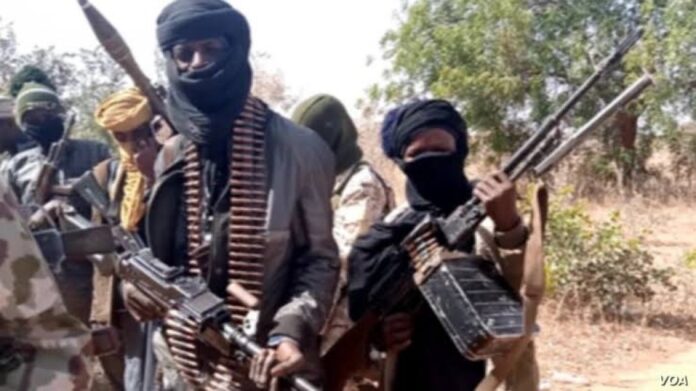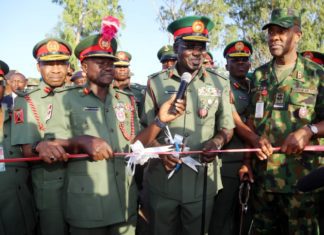Many bandits have reportedly been fleeing the theatre of war in their hundreds to Jigawa, Kano, but especially Kaduna and Niger States, where they have set up camps around Rijana forest, as the military stepped up their campaigns to exterminate banditry in Northwest, especially Zamfara State.
Military sources told Agence France Presse (AFP) a fortnight ago that a large group of Boko Haram terrorists had moved out of their base in North-East Nigeria to join forces with criminal gangs and bandits in the North-West, where they are engaged in weapons training and kidnapping.
After the reported death of Boko Haram leader Abubakar Shekau this year, in a major shift in Nigeria’s 12-year insurgency, Boko Haram’s Islamic State-allied rivals have been consolidating their grip on the North-East.
According to security sources, the Islamic State West Africa Province (ISWAP) has been moving into Boko Haram territory, fighting Shekau loyalists and assimilating or forcing others to surrender to the armed forces.
The movement of Boko Haram fighters could be the latest sign of collaboration between jihadists and criminal armed groups in Nigeria’s northwest, who raid and loot villages and kidnap people for ransom.
According to military sources, a Shekau-aligned faction based in Borno State has sent two commanders and 250 fighters to the Rijana forests in Kaduna State.
Read Also: Tensions are rising as the US moves to name Boko Haram’s sponsors
According to security sources, both commanders are allied with Bakoura Buduma, a Boko Haram chief who remains loyal to Shekau and whose fighters are resisting ISWAP consolidation.
According to military sources, they are the masterminds behind some of the abductions in the northwest.
Boko Haram militants, according to the source, were also teaching the gangs, known locally as bandits, how to use anti-aircraft guns, explosives, and other weapons.
A Boko Haram commander and foot soldiers were moving across the country from their base in Borno State to Kaduna State and other North-West states, according to a Nigerian security agency communique issued earlier this month.
Analysts say there are growing signs that jihadists and bandit gangs are forging deeper ties in which both parties benefit: jihadists supply arms while criminal activity profits them.
Bandit groups have long terrorized North-West Nigeria, but attacks and kidnappings have increased this year as the economic fallout from the coronavirus pandemic fuels criminality.
In a series of high-profile mass abductions of students and pupils for ransom, criminal gangs have targeted schools.
Attackers have also become more brazen in their attacks.
Armed criminals kidnapped one officer from the country’s elite military college in Kaduna last month, and criminal gangs shot down an air force jet conducting operations on their camps in June.
The Army launched a military campaign against bandits in Northwestern Zamfara State, which borders Kaduna, earlier this month, and ordered a complete telecoms blackout to disrupt bandit communications.
Read Also: Boko Haram: Members’ repentance is a positive development – Governor Buni
According to reports, over 800 Boko Haram soldiers and bandits surrendered to troops as the operations grew more intense last week.
The State Security Service (SSS) warned security agencies in Kaduna last week to prepare for possible attacks.
According to the secret police, the Boko Haram terrorist sect’s leaders and foot soldiers have relocated from Sambisa Forest to a forest in Southern Kaduna.
Terrorists are said to have relocated from Borno’s Sambisa Forest to Kaduna’s Chikun local government area’s Rijana Forest.
According to an Army memo, “senior Boko Haram fighter, Ibrahim (FNU) alongside his foot soldiers” were relocating to join their counterparts “under the leadership of one Adamu Yunusu (aka Saddiqu),” according to the Peoples Gazette, an Abuja-based daily.
As a result, the DSS has ordered the Nigeria Security and Civil Defense Corps (NSCDC) to tighten security in the “aforementioned areas and environs,” and its operatives “should be placed on alert and report accordingly,” according to the DSS.
The NSCDC was also “directed to step up surveillance and intelligence gathering on the aforementioned areas and environs,” according to the memo.
This came a day after Lt. Gen. Faruk Yahaya, the Chief of Army Staff, ordered army commanders to step up the fight against terrorism in the country.
Yahaya stated that in the fight against terrorism, banditry, and other crimes in the country, he would no longer accept excuses.
Read Also: Boko Haram Massive Surrender Worries Borno Leaders
He made the remarks during the opening ceremony of the ‘Combined Second and Third Quarter Chief of Army Staff Conference,’ which took place in Abuja on Monday.
“Commanders must, therefore, glean from my ‘Command Philosophy’ to ensure that Nigerian Army units and formations maintain and improve their operational and administrative proficiencies,” he said.
“Commanders must seize initiative and take initiative, taking decisive actions to defeat threats in their respective areas of responsibilities” (AORs).
“I’m not going to take or accept any more excuses. Failure is failure, regardless of the circumstances, gentlemen.
Hundreds of armed bandits were apprehended by soldiers in Maganda village near Allawa in Niger State’s Shiroro local government area on September 13, fleeing a military operation in Zamfara and Katsina states.
The bandits, who were allegedly fleeing through the notorious Alawa thick forest, ran into the military camp stationed at Alawa and engaged the soldiers in a lengthy gun battle.
The bandits were said to have recovered six machine guns, several AK-47 rifles, and bags of live ammunition.
Read Also: Buhari returns from the United Nations General Assembly with a special assignment
According to a source close to the Alawa community, the majority of the bandits who were killed all looked like foreigners because they didn’t look like Nigerians.
Many analysts, including political scientist Professor Adeagbo Moritiwon, are unsurprised that many of the bandits allegedly killed near Shiroro in Niger State appeared to be foreign-looking, with long hair similar to that of the Sahara Desert’s Tuaregs.
“A lot of them are Fulani from outside the country,” says the narrator. We recall a governor in the Northwest claiming that he paid foreign Fulani not to kill Southern Kaduna people.”
Governor Nasir El-words Rufai’s on December 3, 2016, as a one-year-and-six-month-old head of government in Kaduna State, stunned, perplexed, and disturbed many. Despite this, some people – arguably a small minority – were relieved to hear the otherwise disturbing confession.
El-Rufai admitted to tracing some violent Fulani herdsmen with alleged grievances to their homelands in neighboring African territories and paying them to stop the killing of Southern Kaduna natives and the destruction of their communities while speaking to journalists from the comfort of his Kaduna office.
“The elections of 2011 took place while they were moving up with their cattle across Southern Kaduna, and the crisis trapped some of them. Niger, Cameroon, Chad, Mali, and Senegal were among the countries represented.
“The Fulani people live in 14 African countries and travel across the country with their cattle. So many of these people were killed, their cattle were stolen, and they banded together and returned for vengeance, so much of what was going on in Southern Kaduna was actually happening outside of Nigeria.
Read Also: In Borno ambush, ISWAP allegedly kills 12 soldiers and vigilantes
“We got a tip that the late Governor Patrick Yakowa had obtained this information and had dispatched someone to visit some of these Fulani communities, but after he died, everything came to a halt. That’s what we were given.”
El-Rufai told journalists that he swung into action after sharing the findings of the (Gen. Martin) Agwai (retd.) committee set up by his administration to investigate the Southern Kaduna killings.
“We had a group of people go around trying to track down some of these people in Cameroon, Niger Republic, and other countries to inform them that there is a new governor who is Fulani like them and has no problem paying compensation for lives lost, and he is begging them to stop killing.
“After that appeal was made to them, most of the communities said they had forgiven. A couple of people asked for monetary compensation. They claimed to have forgiven human deaths but demanded compensation for cattle.
“We said no problem, and we paid a portion of the bill. “The team went to Niger Republic just two weeks ago to attend a Fulani gathering that they hold every year with a message from me,” the governor said flatly.
Read Also: Abductors in Ekiti release kidnapped lovers 24 hours before their wedding
Interestingly, despite the state’s widespread violence under his administration, the governor’s tune appears to have changed only seven years later.
Join Television Nigerian Whatsapp Now
Join Television Nigerian Facebook Now
Join Television Nigerian Twitter Now
Join Television Nigerian YouTUbe Now





